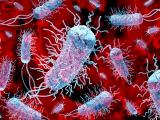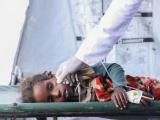Jun 16, 2011 (CIDRAP News) Total cases in the Escherichia coli O104:H4 outbreak centered in Germany exceeded 3,400 today as German officials acknowledged that a cumbersome disease-reporting system slowed the early response to the problem.
The Europe-wide case count reached 3,401, with 39 deaths, according to the European Centre for Disease Prevention and Control (ECDC). The total included 823 hemolytic uremic syndrome (HUS) cases, 2 more than yesterday, and 2,578 E coli cases without HUS, including 48 new ones, all of them in Germany. There were 2 more deaths, both in HUS patients in Germany.
Meanwhile, a team of German authors writing in Eurosurveillance today said the existing surveillance system in their country was inadequate in the context of the E coli outbreak, as it took up to 16 days for reports of cases to move from local officials to the national disease-control authority, the Robert Koch Institute (RKI).
The article explains that under the established surveillance system, reports of Shiga toxinproducing E coli (STEC) and HUS cases travel a long road. The clinical laboratory or physician submits reports to the local health authority, which must validate them before sending them on to the state authority "by the third day of the following week." The state authority again validates them and passes them to the national level within the following week.
"The rather long time limits permitted for communicating information on cases from the local to the state/national level led to delayed recognition of this outbreak," the article says. "The first report at the national level was received on 18 May 2011, while the first outbreak-associated cases fell ill on 1 May, with a sharp increase in case numbers on 9 May. This is a limitation requiring further evaluation."
After the outbreak was recognized, health officials took steps to speed the flow of data to the RKI, centralize the exchange of epidemiologic information, launch active lab surveillance, and implement a syndromic surveillance system for bloody diarrhea in emergency departments, according to the report. These enhancements of the surveillance system were "rapidly and effectively implemented," it says.
Germany's disease reporting and response system came in for some criticism from the editors of Nature today. In an editorial, they referred to the country's "bizarrely complicated system" for responding to disease outbreaks and "an alarmingly outdated way of transmitting information between physicians and agencies."
The editorial lays some of the blame on Germany's federalized system, which, in the wake of World War II, was designed to minimize centralization and delegate many responsibilities, including health, to the states.
"Clearly, a way must be found to make an exception to the devolved-responsibility rule, at least when it comes to infectious diseases," the editorial states. "The Robert Koch Institute, which has proven itself extremely competent in handling its part of the E. coli crisis given the blocks put in its way, needs much more power."
In addition, in an epidemic, the German government needs to speak to its people with one voice, which should be the RKI, the article says.
See also:
Jun 16 Eurosurveillance report
Jun 16 ECDC case numbers
Jun 15 ECDC case numbers
Jun 16 Nature editorial


















